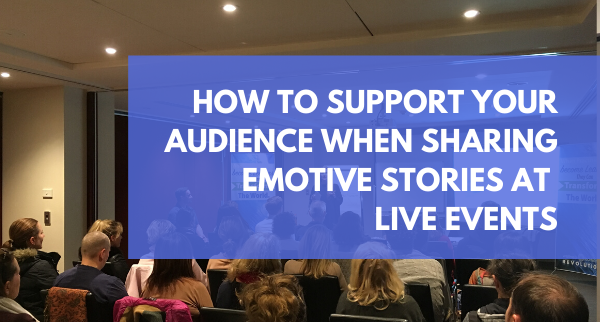Choosing to share your own story can be slightly trickier too, than simply choosing to share about a subject area you’ve been trained in, or using a third parties case study or a client story (with permission) too because you’re so closely linked to the subject matter being shared. At times, as you share, and the audience reacts or responds and (when invited) reflects back to you their questions or own experiences, as per the intention you’ve set, it’s inevitable that it’s going to trigger any parts of you too that have yet to heal. And while everybody is getting potentially triggered, some part of you still has the purpose of the event to fulfil upon, and the associated speaking, training or facilitation related goals, skills or benefits that you promised this event would help them achieve, to actually help them achieve. Particularly when it comes to managing the emotional wellbeing of your audience in response to sharing emotive/personal stories, one question that I think it is really important to ask from an Event and Audience Experience Management perspective is : what support will that mean that myself or my support crew will likely be required to provide the audience in response to this sharing, to ensure that the attendees can have the best possible experience when attending and best be supported to achieve their goals? Having been trained in and worked as a Counsellor and Group Therapy Facilitator, in addition to the experience I’ve gained as an Event Manager and Emotional Support Crew Member at various small to large scale Transformational events and festivals (later Business and Leadership focussed ones) and of course, as a Speaker myself, planning out the provision of emotional support strategy for participants has been a big part of my work over recent years. A Counsellor, like most Coaches, Facilitators, Trainers and Educators, is trained to understand that the process of intellectual and emotional inquiry and transformation doesn’t just end when the segment of the event, or the event door closes. It continues on into life. So they know that, if they’re going to be bringing up questions, material or running a process that is likely to substantially trigger some or all participants in some way, about some area of life in which they’ve either previously or are presently experiencing major discomfort, then it’s good to have both crew support for this built into the event itself, as well a follow up process to both:
That doesn’t mean that you personally have to be the one providing all of the additional support if some of it is outside your area of expertise. But it does mean providing participants with the following kinds of support IN event and POST event, like :
So that they feel well loved and supported through and beyond whatever might’ve come up for them through attending the event. Particularly if they publicly broke down, we need to be mindful of the fact that that can feel potentially very embarrassed or worried that they just publicly humiliated themselves. In which case, just you or your crew touching base on the other side to let them know you’re still good and they’re still welcome, can really help people who’ve been through an ackward group event moment re-engage with your community, rather than disengage on the the other side. Not to mention so that, as an Industry Professional, you’ve met your duty of care obligations to your attendees. AND as a Leader, you and your team have also just publicly role modelled to your community how you treat the most vulnerable members of your flock, which creates ongoing safety and stability for the rest of the tribe too, to keep engaging with the tribe beyond the event. The second reason you want to do this, is for your own benefit. Particularly if you’re just starting to put yourself out there and test sharing around your personal journey, it’s highly likely that there will be moments where people’s reactions to and interpretations of the information you’ve shared may well trigger additional layers of your own reaction and the need for deeper healing around your still vulnerable bits within you. Those moments when they happen in front of a crowd, can serve to knock us off centre a little bit. And that is when it pays to have friendly support people just for YOU in the room, to help you watch over the audience and help YOU re-find your groove in those moments. This is actually just as important for business or leadership or industry events, as it is for personal development or therapeutic ones. Because anything from, for example: -sharing a rags to riches story, to -an illness recovery story a loss story (unemployment, redundancy, relationship breakdown a death) -an instance of anxiety, depression or mental illness -an abuse story -an addiction story -a coming-out story, or even you sharing a happy family or work story can and will often trigger a percentage of people in the room, who may also be directly or indirectly (through someone they care about) being impacted by some circumstance in that area of their life. It doesn’t mean you or they are doing anything wrong by disclosing or reacting. It just means being mindful of the fact that being authentic and vulnerable and choosing to share a personal story, may, exactly as you might have hoped it would, indeed touch and initiate the learning, healing or transformation process in the very people you’re there to help. And having a crew support process and a follow up procedure for your attendees, I think, as well as support for yourself, is an essential add-on to consider for any event you might be running or speaking at, where personal stories might be shared. Not just to ensure that they feel well loved and cared for and as an ethical consideration, but as a standard part of any world class event management, client relationship strategy and your speaking strategy. If I can ever help you with formulating such strategies for your events or speaking engagements, happy to help, just let me know. Until next time.... Nat xx |
WriterActress, Artist, Singer, Coach, Facilitator, Speaker, Writer Nat Ferrier talks about self expression, Women’s Leadership Mindset & communicating with greater confidence, presence & psychological safety. Archives
March 2024
Categories |


 RSS Feed
RSS Feed